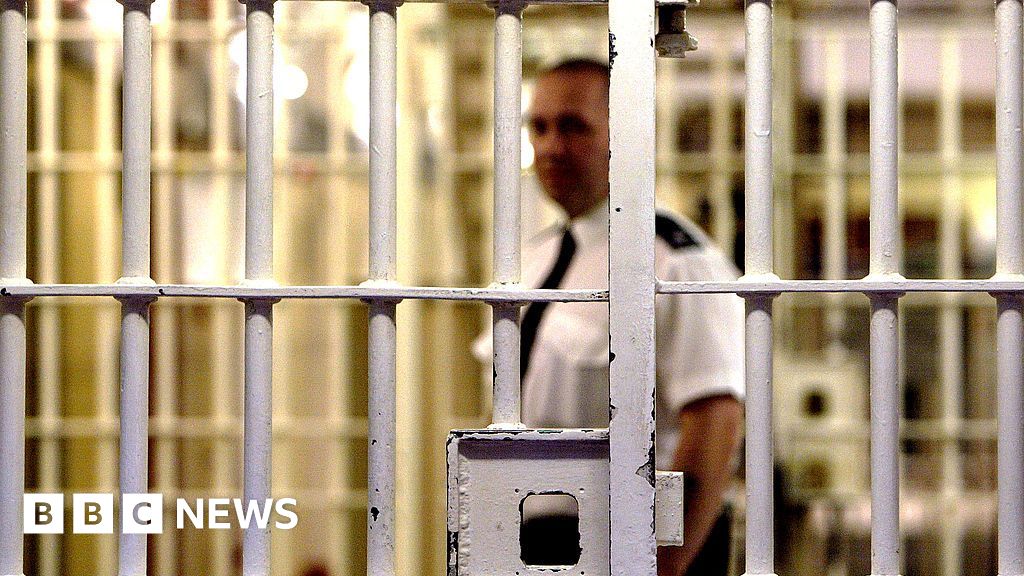World
Plans to tackle prison overcrowding to be set out – BBC News

Image source, Getty Images
- Author, Jennifer McKiernan
- Role, Political reporter
-
The justice secretary is to set out plans later to address prison overcrowding in England and Wales after concerns that jails may run out of space within weeks.
Shabana Mahmood has said emergency measures are needed to “pull the justice system back from the brink of total collapse”.
The plans are expected to include releasing some prisoners early, the BBC confirmed on Thursday.
Prisoners on “standard determinate sentences” are expected to be released after they have served 40% rather than 50% of their sentence.
In March, the then justice secretary Alex Chalk announced plans for some prisoners to be released up to two months early.
But Mr Chalk, who lost his seat at the general election, told the Today podcast there were also plans to go further and release some prisoners after 40% of their sentence – as being announced today – and to send fewer people to jail in the first place.
BBC News understands that several Conservative cabinet ministers supported the idea.
But Rishi Sunak refused to sign it off and the election was called before the issue was resolved.
New Prime Minister Sir Keir Starmer said the situation with prisons was “shocking” and showed “gross irresponsibility” from the previous government.
His Labour administration needed to “pick this up and we have to fix it”, he said, speaking during a news conference at the Nato summit in Washington.
Asked a question about the prisons announcement at the summit, Sir Keir added: “We’ve got far too many prisoners for the prison places that we’ve got and we soon will have.
“You should have enough places for your prisoners that judges are sending to prison.”
To run smoothly, the prison system needs 1,425 free cells in men’s prisons, but media reports suggest only 700 spaces are currently available.
The situation is so serious the “criminal justice system is on the brink of collapse” because “we are running out of space”, a former prison governor has told the BBC.
Mark Icke, who was Governor of HM Prison Swaleside until 10 weeks ago, told the Today programme the crisis is “unprecedented” and that prison governors have been “warning for some time” that “we’ve got far too many prisoners in our system.”
Mr Icke is now Vice President of the Prison Governors Association (PGA), which has welcomed the announcement and called for a “full review”, saying “the public must never be placed in this position again”.
Asked if moving from releasing prisoners after they have served 50% of their sentence to 40% was a necessary measure, Mr Icke said “we’ve got no choice” and so it’s “the right thing to do for now.”
Latest figures show 83,380 inmates are currently being held in the adult male estate and Mr Icke believes the plans “will release between 8 and 10,000 people” to “give us some breathing space”.
Asked if violent prisoners could be released under the plans, he said “we’re yet to hear the finer details”.
But he said he believed the government “has listened to the advice they’ve been given” so “serious violent offenders, those convicted of sexual offences and anything related to domestic violence should be excluded”.
However, the aunt of murdered law graduate Zara Aleena has branded the plans a “dangerous gamble with the public safety”.
Ms Aleena was murdered by Jordan McSweeney nine days after he was released from prison and while he was in the process of being recalled after his licence was revoked for failing to meet probation officers.
Her aunt Farah Naz told BBC Breakfast that underfunding in the probation service, which monitors prisoners when they are released from prison midway through their sentence on licence, means offenders like McSweeney are not being properly supervised in the community.
“That’s what happened in our situation,” she said. “It was a man that was emboldened because he was not supervised. He was not assessed. He was constantly allowed to do what he wanted to do.”
Rory Stewart, a former Conservative prisons minister who planned to abolish short sentences, said the prisons crisis is a “total disgrace” and the only answer was “to put fewer people in prison for less time.”
The focus should be on those who have “committed genuinely horrifying crimes”, he told BBC Radio 4’s Today programme and imprisoning people for minor offences is “completely mad”.
He added: “We have to be more patient in explaining that many of the people who are in prison today should not be in prison — and putting them in prison actually endangers the public because it destroys their lives and makes them more likely to offend.”
The Ministry of Justice is already building six new prisons to create an extra 20,000 places as demand grows for cell spaces, partially because of the Government’s campaign to hire 20,000 more police officers.
About 6,000 spaces have been created and about 10,000 will be built by the end of 2025.







:max_bytes(150000):strip_icc()/roundup-writereditor-loved-deals-tout-f5de51f85de145b2b1eb99cdb7b6cb84.jpg)


